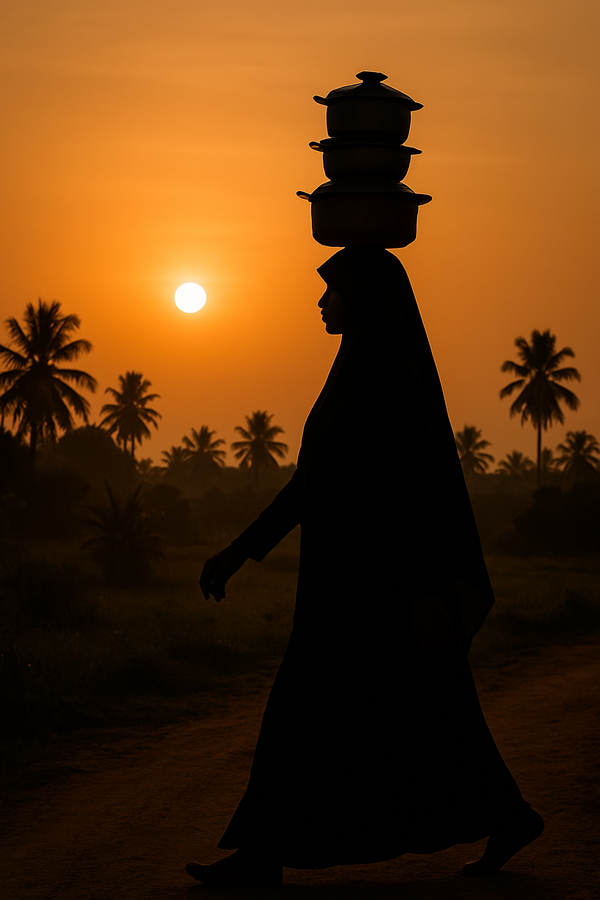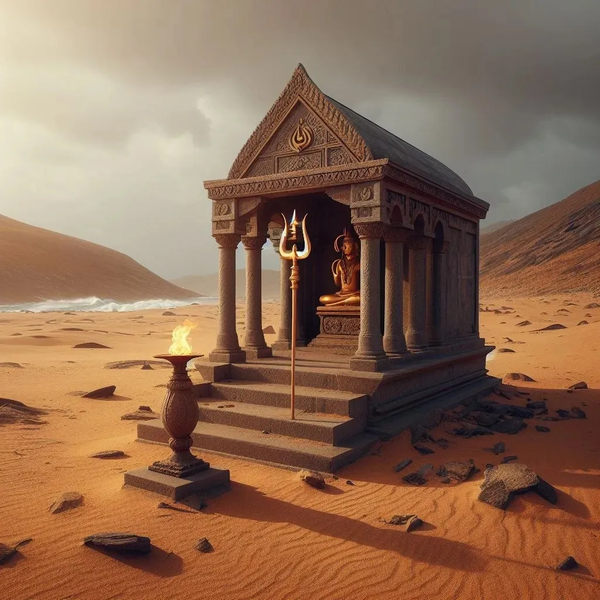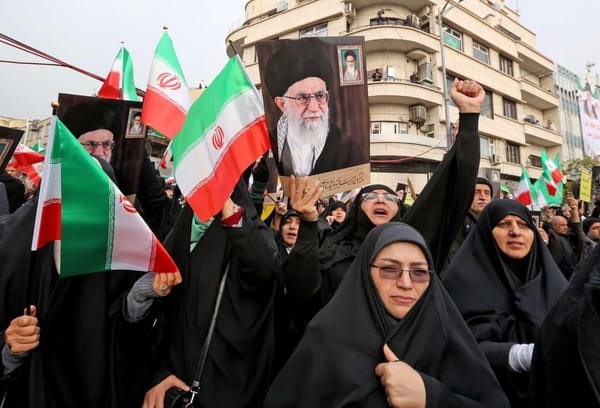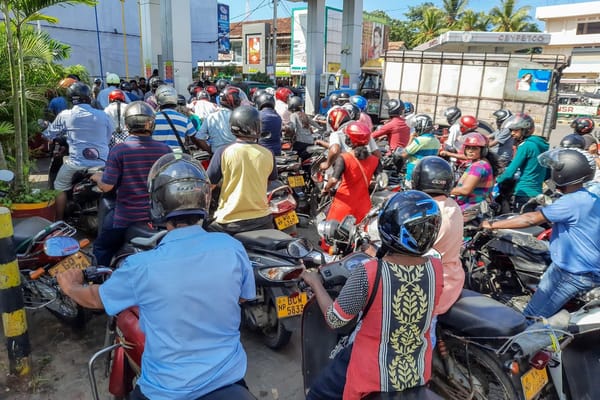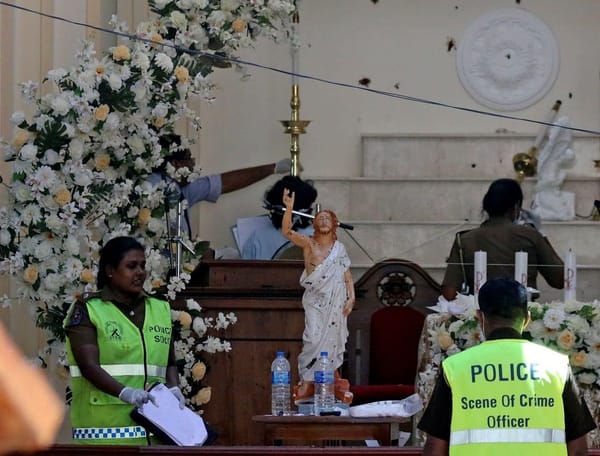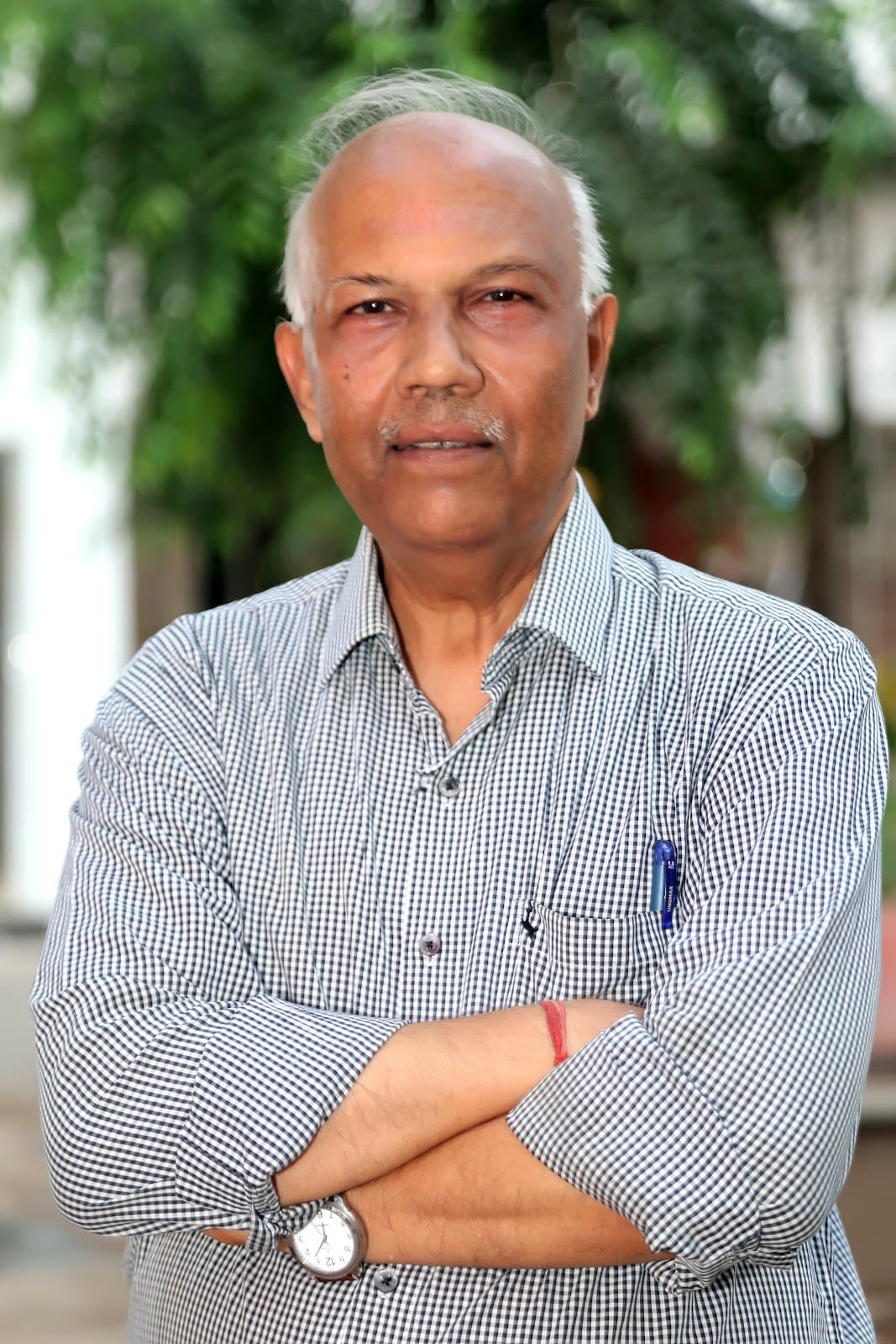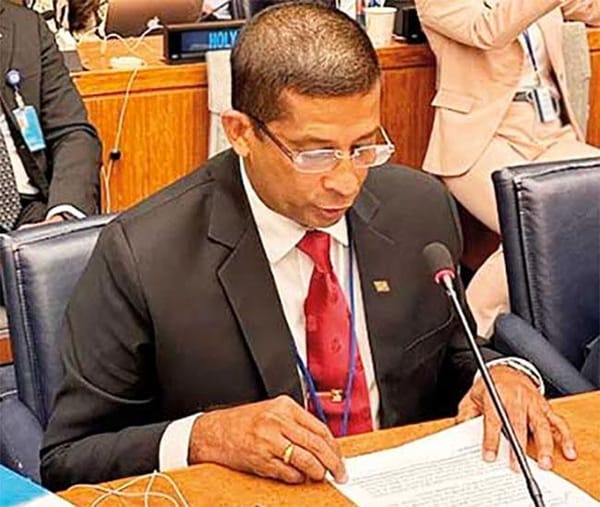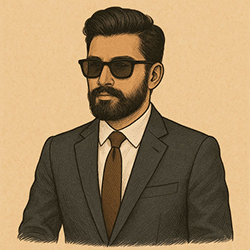Translated from the original Tamil short story yāṉaikkatai (யானைக் கதை) by Shobasakthi. The original story is available at his website. If you have any questions or feedback, please contact ez.iniyavan@gmail.com.
When Guillaume Vernon, the linguistics professor, read ‘Me Grandad 'ad An Elephant,’ the English translation of Vaikom Muhammad Basheer’s celebrated novel, he went all the way to Kerala for an audience with the great master and wrote a long essay in French about the meeting. He may well have been the last white man that Basheer met. I had never even dreamed that this great professor and I would sit in the same train compartment, even in adjacent seats for a long journey. I stood up as soon as I saw him. I continued to stand out of respect for the septuagenarian professor until he sat down himself.
Like every French professor, he was wearing many layers of clothing. It took five minutes for him to patiently remove each item one by one and place them on the rack above: a small red beret with a tassel, a long, knitted shawl with elaborate patterns around his neck, an overcoat that came up to his knees, and the thick black felt shirt inside with lots of cat or dog hair sticking to it.
When the professor settled down comfortably into the window seat, I sat down in the seat next to him. I had seen the professor at some university events but had never got the opportunity to speak to him.
We should count it as our good fortune that Professor Guillaume Vernon, having gone all the way to Kerala, chose to focus on Tamil instead of Malayalam. He started learning Tamil only when he was over sixty years old. He studied at Inalco, the French national institute for oriental languages and civilizations. He was greatly attracted to Tamil literature. He did not just stop with reading modern Tamil literature. He had even translated some modern Tamil short stories into French and published them.
We were traveling by train to participate in the ‘Literary Festival for Asian Languages,’ taking place in Germany. I silently thanked the faceless event organizers who had booked us into adjacent seats.
Once the train started rolling, I waited for an opportune moment to strike up a conversation with the professor. But he was gazing at the ceiling with his eyes half-closed. One could not say that his clean-shaven face had a sense of calm. But it sported a smile. He was not really smiling. But the structure of his face made it look like he was smiling.
Presently he opened his eyes and was about to open the thick newspaper on his lap. It was a large-sized daily newspaper with countless pages. He would not finish reading it before we reached Germany. So, I hastened to introduce myself to Professor Guillaume Vernon. He was eager to chat, contrary to what I had assumed. But I was certainly disappointed that he had not read even one of my short stories.
“What do you write about?” The professor asked me.
That was a difficult question to answer. Although I write about a variety of topics ranging from caste, women, gender identity, refugee life, to travel, I have been typecast as someone who writes about the war. I wanted to convey my entire range of interests to the professor. So, I started listing all the different topics, adding “war” only at the end.
The professor asked me a very surprising question: “How many stories have you written about elephants?” I assumed that the professor had a profound reason behind such a question; so, I racked my brain trying to remember when I wrote a story about an elephant. Only then did it dawn on me that I had not mentioned an elephant even in a single place in a single story. I smiled weakly and said, “No.. I have never written about elephants.”
Professor Guillaume Vernon was stunned as if the train we were traveling on, at three hundred kilometers per hour, had derailed. He was clearly agitated. “What did you say… you had never written about elephants? How is that even possible? I cannot believe it!” I thought he had lost all confidence that he was sharing his compartment with a writer. How strange!
“I have never even seen an elephant in my entire life until now,” I confessed to the professor. Even the natural smile that had been glued to his face disappeared. Perhaps he thought it was a waste of time to talk to me. He closed his eyes again and leaned backwards. I waited anxiously, hoping that he would open his eyes so that I could tell him that there are no elephants in Jaffna.
The Jaffna peninsula has no forest, no river, no mountains, and no elephants. But it is true that occasionally elephants did come by. But I had not had the good fortune to encounter one.
I think I was around ten at the time. There was talk that an elephant was going to be brought down for the temple festival at the Puḷiyaṅkūdal ammaṉ temple. The news that the mahout was going to walk the elephant all the way from Vaṉṉi had spread through the village like wildfire. Because the elephant and the mahout would surely have to cross our village on their way to Puḷiyaṅkūdal, we eagerly stood vigil by the roadside for several days. But the mahout had stealthily taken the elephant past our village while I was at school. Those boys who did not go to school got to see the elephant. Even my parents saw it from a distance.
Once, before the war broke out, Gemini Circus from India visited Jaffna. They had set up camp at the Muṟṟaveḷi Greens and held shows there. Those who went to watch the show said they had not only elephants but also lions, tigers, bears, and various other exotic animals. When I asked my family to take me to a show, I was told that we did not have money. Even throwing a tantrum the entire night did not sway any minds. There was no zoo in Jaffna to exhibit elephants either.
I joined the Tigers, the Tamil militant group, when I was very young --- Colloquially, people referred to the group simply as “the movement.” There was no elephant on the seven islands where I had worked on behalf of the movement. When I left the movement, I went to Colombo right away. Those were trying times; it was too risky for young Tamil men to wander about freely in Colombo. So, I languished in my room the whole time I was in Colombo. From the room, I went directly to the airport and traveled overseas. There is no elephant in France, where I live now. For some reason, I have not had the chance to visit the zoo here either. In fact, I do not even know where the Paris zoo is located. I have traveled frequently to India and Thailand. But some curse or the other had kept me away from elephants, so that I have not yet been able to set my eyes one. Perhaps in a previous life I was a ruthless elephant hunter!
Professor Guillaume Vernon opened his eyes again and picked up the newspaper. I resolved that this time I would somehow tell him something to catch his attention. Before he could open his newspaper, I said, “When you asked about elephants, I remembered an incident. Whenever I hear the word ‘elephant,’ I immediately think of this story. But I cannot say for sure that it would interest you,” I said hesitantly.
The professor’s face suddenly lit up. His eyes sparkled as if I was going to say something profound. In his excitement, he pivoted himself at his hip so that his entire upper body turned to face me. The enthusiasm of an eager audience is infectious and triggers outrageous imaginations in one’s mind. But this story really has no need or room for exaggeration. Exaggeration would only amount to betraying ‘Withdraw’ James.
2
It was the rainy season of the year 1984. Surely you know that there is an archipelago of seven individual islands above Jaffna. They had Dutch names like ‘Delft,’ ‘Velsen,’ and ‘Leiden.’ The Dutch had bestowed those names when they colonized Sri Lanka. White Chandran was the Tiger in charge of the archipelago. You could say that I was like his right hand. I was just seventeen, and White Chandran was over twenty. I was an expert swimmer. I had the confidence to believe that I could even swim all the way to India. The Tiger movement had a great need for expert swimmers for various reasons. We spent most of our time on water rather than land. Therefore, White Chandran always kept me close at hand.
Our camp for the archipelago was on the island of Leiden. You must not imagine some fancy, elaborate guerilla barracks. White Chandran, two other boys, and I were staying in an abandoned hut. White Chandran had an ancient revolver. I, too, had an armament called a viḷakku. It was a hand grenade the size and shape of an ear of corn. One had to light its wick before throwing it. Whether or not it would explode was beyond our control. Since the Sri Lankan forces frequented the area, we slept in tobacco fields at night. We used this camp as our base in trying to expand the Tiger movement to the other islands.
There is an island called ‘Assen’ in the middle of the sea. It is a tiny island. If you stood on one end of the island, you could clearly see what was happening on the opposite end. Except for an occasional palmyra or coconut palm, no other tree grew there. It is an open, desolate, saltwater island. At the time, there were about a hundred and fifty families living there. An island resident by the name of Pavānanthaṉ was in contact with us. He was the one who took Tiger publications and pamphlets to secretly distribute within the island. There were Sri Lankan navy camps in the islands to the north of and to the south of Assen. The waters around Assen were always under intense surveillance by navy speedboats. Yet, people from Assen traveled to other islands in their boats. Fishermen, too, plied their trade. Occasionally, passengers or fishermen were attacked by the navy. The people of the island had grown accustomed to living with the brackish water and other dangers. Could one starve to death because one was afraid of the danger to their lives?
I will tell the story briefly. Pavānanthaṉ had enlisted eight boys from the island as Tiger supporters. He wanted them to be given military training because, he said, without such training, they might defect to a rival militant group. At the time, we had started a week-long program of ‘local training’ to clandestinely provide combat training to local youth in their own villages. Therefore, White Chandran arranged to hold such a training camp on the island of Assen. ‘Withdraw’ James was to be sent from Jaffna to conduct this training. It was my responsibility to take him by boat to Assen.
This was the time when the general public had developed fantastic myths about Tigers. Even if they had never seen a Tiger fighter in real life, their fertile imagination concocted an elaborate vision of what a Tiger warrior looked like. But most of us looked nothing like that. Some of us were delicate and anemic. But ‘Withdraw’ James fitted the Tiger of the popular imagination exactly.
He had a slightly short stature and jet-black skin. He had the physique of a bodybuilder. He sported curly hair and a majestic mustache that curled upwards at the edges. His eyes were sharp, and lips thin. He was about twenty-five. He had the ability to laugh in his hoarse voice without opening his mouth. When he guffawed, it sounded like a tiger growling. There was a Sterling submachine gun inside the cloth shoulder-bag he carried. Our ‘local training’ did not involve shooting. Other than physical exercises, our recruits were only taught how to hold a weapon and how to take up a shooting position.
I had arranged for a boat at Meliñchimuṉai in the island of Leiden. The boatman was a Tiger supporter. He transported ‘Withdraw’ James and me to Assen. Using a motor would risk inviting a helicopter attack. So, the boatman used a punt pole to impel the boat in shallow waters, and oars to row in deeper waters. We had undressed down to our underwear to travel like fishermen do. He let us off on the shores of Assen and promised to return in the evening eight days hence to ferry us back.
Pavānanthaṉ was waiting for us. He had managed to find an isolated, secluded area even on that tiny island. It was a largely dilapidated old church. It had been built during the Dutch period and now lay abandoned. Arrangements had been made to conduct the training inside the church. As Pavānanthaṉ’s friend, James and I stayed at his house. Only his elderly parents lived there with him. Although the people of the island sort of knew who we were, they did not let on. They acted as if they believed the backstory that we spun for them. They believed that whatever Tiger boys did had some profound underlying rationale.
The next morning, ‘Withdraw’ James started the training program. The training lasted for only four hours each day. There was a total of nine trainees, including Pavānanthaṉ. I was the model. James had me stand holding the gun and used me as the model to teach the new recruits. The moment the boys showed up for training, they implicitly became members of the Tiger militant movement. According to the rules of our movement, they were barred from joining any other political group, for life. It was left to me to sternly explain all these strict rules to the new recruits. James jovially interacted with the recruits, cracking jokes without a trace of strictness or any hint of discipline in his approach. I thought people who are trained by him would be unable to hit even a palmyra tree at a ten-foot distance.
There was no doubt that ‘Withdraw’ James was an expert in handling weapons and was a master war tactician. Otherwise, the Tiger leadership would not send him from village to village to train new recruits. But there was also a strange story about him circulating within the movement.
The Tigers had gone on a mission to attack some police station or the other. There were seven militants in the assault force, including James. As they approached the police station under cover of darkness, they heard an explosion. James yelled, “Withdraw!’ and started running back. When the policemen heard James’ strident scream, they themselves fled to the jungle seeking cover. That day, the Tigers captured the police station without any loss of life, and without even expending a single bullet. James, who had fled, had wandered all over the place and returned to the camp only the next morning. People had said that they heard the explosion from as far as two miles away. From that day, the nickname ‘Withdraw’ had stuck to James.
James called me ‘thambiyā.’ Once he told me, ‘‘Thambiyā, true victory is to win Tamil Eelam without any loss of life.” He continued, “The people of the Philippines conquered a dictator’s fortress merely by marching there holding burning candles.” My plan was to take the recruits he was training to Maṉṉār or Vavuṉiyā because if they stayed on in their own village, they would be swayed by love or family. But James undermined my plans by telling the youngsters, “Tamil Eelam needs educated youth, too. After this training program, you must go back to your schools to continue your education.”
On the second day of training, it started to rain heavily. There were occasional storms. I was firm that despite the torrential rain, the training must go on. “The gun will get wet, thambiyā,” said James irresponsibly. “I will take care of it. Even if I get wet, the gun will not,” I reassured him. Even worse, half the trainees had absconded from training on account of the heavy rain. Pavānanthaṉ and I had to go from house to house to drag them one by one back to training.
On the fourth day, the rain and the storm had subsided, and the sky had brightened up. We received word that White Chandran was coming to inspect the training the following morning. Therefore, I was in a state of excitement. If White Chandran found the training program wanting in any way, he would hold me, not James, responsible, because he did not outrank James.
When it was barely dawn, a boy brought exciting news that two Sinhalese had washed ashore on Assen. Apparently one of them was able to speak haltingly in Tamil. “Thambiyā.. Come! Let’s go see,” said James. I took the gun, put it into his shoulder bag, and proffered it to him. “No, let’s not take the thing, there will be a crowd of people,” he said. Halfheartedly I decided to leave the gun behind. James asked the messenger to stand watch over the gun. How irresponsible!
A crowd had already formed at the beach. In their midst, two middle-aged men were sitting on the sand. They were wearing only short pants. They had strong physiques and closely cropped hair. I guessed, ‘These must be sailors; perhaps they were blown off course either because their boat malfunctioned in the storm, or because they escaped an attack by some other militant group. They must have swum ashore.’ I awaited James’ order. I was ready to pounce on the Sinhalese the moment James gave me as much as an eye signal.
But shameless ‘Withdraw’ James did not even look at me. He went straight to the two men and said, “Don’t worry… my name is James. What are your names? Where are you from?” Had James gone bonkers or what? I had hidden his name not only from the people of Assen but even from Pavānanthaṉ and the other trainees. I introduced him to everyone only as ‘master.’ But now he was revealing his name to the Sinhalese with a grin!
The Sinhalese were named Chandrapala or Indrapala… I cannot remember clearly anymore. They were both shaking. The one with the halting Tamil spoke, while the other kept his mouth closed and cried. They claimed to be fishermen from Kalpitiya. Apparently, they were fishing in the Mannar bay when their catamaran was blown off course by the storm. Their catamaran had come apart the previous day, unable to withstand the storm’s assault. They had held on to a log and swam ashore.
“Where is that log?” I asked. “As soon as we could touch the ground with our feet, we let the log go. We didn’t have the strength to drag it ashore,” said the Sinhalese. I could not believe it. Kalpitiya is so far from Assen. How did they come all the way here without landing on any of the other islands or shorelines along the way? That, too, precisely at the time when there is a training camp going on here. They could even be from the military intelligence unit.
While I was racking my brain thus, James was busy playing host. He took some money from his pocket and asked a little boy to go buy some tea and biscuits for the two men. I had heard that it was standard practice within the movement to feed prisoners before they were bumped off. I thought, despite his playfulness, James was after all serious when it came to serious business. Otherwise, how would the movement have appointed him as a trainer!
In those days, any Sinhalese who entered our areas knowingly or unwittingly did not return, alive or dead. Even if one militant group took pity on them, they were likely to be caught by another. Earlier, a Buddhist monk who wandered the streets of Jaffna, beating on a small drum, declaring that he was seeking peace, was made to disappear by the movement. I think he was probably fed a nice last meal before he was killed. The custom among militant groups was that the last meal for any Sinhalese who wandered into our area was our responsibility.
Unaware of this, the two Sinhalese squatted on the beach sand and were eating their biscuits dipping them into tea. James asked Pavānanthaṉ to bring the two sarongs and shirts that were drying on the clothesline at his home. One of those pairs was mine! It was humanitarian to feed a prisoner before killing him. But there was no custom of clothing a prisoner before killing him. We ourselves eked out an existence with barely one change of clothes and underwear. I did not even own a pair of slippers. James came from the town, so he had a pair of slippers on.
Someone brought a palmyrah-leaf box full of piṭṭu and sambal for the two Sinhalese men. They ate everything without leaving a crumb behind. Someone who had been adrift on the sea for two days, with nothing to eat, would have bloated stomachs from swallowing salt water. They would not be able to eat anything without vomiting it out. But this Chandrapala and Indrapala ate everything given to them. I thought perhaps they realized that this was their last meal.
When the clothes arrived, the Sinhalese put them on. At eight in the morning, a passenger motorboat leaves Assen. It would take a circuitous route to the Kāraitīvu navy camp to undergo thorough checking before proceeding to Leiden. ‘Withdraw’ James decided to send the Sinhalese away on that boat. I could not openly question his decision. Still, I murmured, “There is little chance that they could have come all the way from Kalpitiya.” Disregarding the gravity of the situation, James joked, “If the Dutch could come all the way here, why couldn’t these people?”
The Sinhalese brought their palms together to bid everyone farewell at the Assen harbor and boarded the motorboat. They even invited everyone to visit their homes if we were ever in Kalpitiya. James warned them again and again, “If you disembarked at the Kāraitaīvu navy camp, they would send you safely to Kalpitiya. If you went anywhere else, you would be in trouble.”
As the boat carrying the Sinhalese left in one direction, a wooden boat carrying White Chandran and a boy called Selvathi, a Tiger supporter, arrived from the other direction. Selvathi was an expert rower.
White Chandran had come all the way to inspect the training camp. But the trainer James was tired from waving goodbye to the Sinhalese from the shore. He accompanied White Chandran to the abandoned church that served as our training camp. I ran to Pavānanthaṉ’s house to fetch the gun.
When I reached the church carrying the gun, White Chandran and James were arguing calmly but with neither one yielding the argument. When White Chandran glanced at me, I understood the meaning of that glance very well: “Did you go along with all this, you dog!”
“James! You should not have let those Sinhalese go… they would alert the navy camp in Kāraitaīvu about your presence here. We are already in danger.”
James shook his head sideways and said:
“No… they don’t know that we are tigers…”
“A smart intelligence operative could identify you within a minute, just from your activities. Two of them, not just one, came here.”
“So, what do you suggest that I should have done, machāṉ?”
White Chandran looked sharply at James. His mouth curled in derision. “Why, can’t you get a spade in this village?”
“So, I should have buried them alive… is that right?”
White Chandran turned his gaze towards the sea, and said:
“Aiyō! Why would we bear that burden? You do have the ‘stuff,’ don’t you? Even if you spent a couple of bullets, it won’t be a loss for our movement. In fact, it would have been profitable.
“James was quiet for a moment. His left foot was rooting around in the sand. Then he said softly:
“I cannot deal with a dead body!”
I thought, “My goodness!” White Chandran must have felt the same. He would certainly report this incident to the Tiger leadership. ‘Withdraw’ James had unnecessarily landed himself in trouble. I was not sure where he got his theory of winning a separate state without loss of life. I thought I should ask him about this one day. But events overtook us.
A little irritated, White Chandran declared that he was going to stop the training and take James and me away from the island. James took hold of Chandran’s hand, shook it vigorously and said, while laughing out loud, “It is just two more days. Let me complete it and then return.” That evening, when White Chandran was leaving Assen, he warned us again, “Be careful.”
I could not fall asleep that night. I kept thinking about the two Sinhalese. I kept the gun at the ready by my pillow. But James was snoring. At around four in the morning, all the dogs on the island of Assen started howling. I jumped and sat up on my mat. I heard the rustling of people moving about outside.
I grabbed the gun tightly and headed outside stealthily, walking like a duck. Pavānanthaṉ’s house was by the main road. I crouched down by the fence and peeked out through the gap between the palmyra petioles on the fence. I saw a few flashlights moving about. In the stillness of the morning, I could clearly hear the whispers in Sinhala. The navy had landed in Assen.
I moved over to the side fence noiselessly. I saw some people moving quietly into the yard next door. I heard someone knocking on the neighbor’s door, whispering, “James… James,” in the tone of a man calling out his lover. If I went out walking like a duck, I returned back to Pavānanthaṉ’s house leaping like a wolf. I roused James. He woke up, moaning. I handed him the gun and said, “The navy has surrounded us.” James instantly whispered, “Withdraw!” into my ear.
We escaped through the fence in the back. There was no sign of the navy on that side. We moved towards the beach in the cover of darkness. A helicopter appeared from the south and started hovering around Assen.
We were both hiding under the wild date palm bushes by the shore. At any time, the navy could encircle this bush. In any case, sunlight would fall on this island in about an hour. There was no prospect of staying hidden in that light. The navy knew that James was here. They were looking for him by name. They would not return without capturing him. At that point, two gunshots rang out from the eastern tip of the island.
“Those Sinhalese betrayed us,” I said angrily.
“No, thambiyā… they would not have given us away. They are fishermen,” said James.
“How do you know?” I asked with irritation.
“A fisherman can always recognize another fisherman, thambiyā,” said James.
Now we heard an explosion from the middle of the island. A helicopter was flying very low dipping and rising above the houses. From time to time, we could see the lighthouse in Velsen glitter. James asked, “How far away is Velsen?” I responded, “Less than three miles.” James said, “Let us jump into the sea and swim away before dawn.” We did not have any other choice.
James and I stripped down to our underwear. We wrapped the gun and the hand grenade up in our clothes and buried them in the sand. Then we crawled our way to the shore and took refuge in the bosom of the mother sea. The lighthouse in Velsen showed us the way.
We were making progress, rising over the waves that rolled over one after another. Suddenly, James shouted, “It is not a good idea for both of us to go together, thambiyā,” and swam away in a different direction. We did not agree where or when to meet again. We could not decide on a meeting point anyway. The tracks in the sea water was made up of whirlpools.
By the time I approached Velsen, battling wave after wave, fishermen’s boats were returning to the shore. I climbed aboard one of them. The fishermen in the boat said that the navy speedboats were circling around Assen. They took me all the way to Leiden safely.
As I approached the Kaṇṇakaiyammaṉ port in Leiden, I saw Selvathi waiting on the shore. When he saw me, he galloped towards me and said, “The navy has caught White Chandran.” I lost all my senses hearing this.
The previous evening, when Selvathi and White Chandran had left Assen in the boat, they saw a navy speed boat speeding towards them about a mile away from Leiden. Once they realized that the speed boat was pursuing them, White Chandra had thrown his revolver and cyanide capsule into the sea and had stood up in the boat with his hands up. Selvathi had jumped overboard and dived into the sea.
I waited for ‘Withdraw’ James. I sent someone to Velsen to make enquiries. It turned out that he did not show up there. I was hanging around in Leiden hoping for a word from James. After three days, the news did arrive. On the Paruththiyadaippu coast, a body was washed ashore. The salt water had bloated the corpse. They said it was lying on the shore like an elephant. I did not want to see the corpse.
Professor Guillaume Vernon straightened his body and looked at the ceiling. As he removed his glasses and put them in his shirt pocket, he said, “Yes, it is true… you don’t need to have seen an elephant to remember an elephant.” A smile graced his face again.
January 2021



